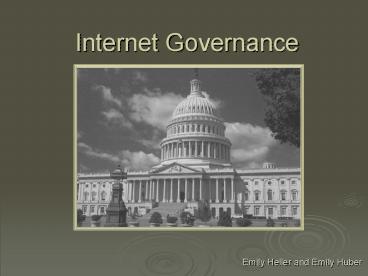Internet Governance - PowerPoint PPT Presentation
1 / 20
Title:
Internet Governance
Description:
'Some words may appear in print but you must not speak them on the radio. ... First of legislation to censor the Net. Focused on protecting youth ... – PowerPoint PPT presentation
Number of Views:36
Avg rating:3.0/5.0
Title: Internet Governance
1
Internet Governance
- Emily Heller and Emily Huber
2
Overview for Today
- First Amendment
- Federal Acts to regulate Internet content
- Defining Offensive Speech
- Filtering content for youth
- What if the Internet were a real place?
- Spam
3
Changing Ways of Communication
- For the first time in history, we have a medium
(the Internet), in which you dont have to be
rich to have access, and in which you dont have
to win the approval of an editor or publisher to
speak your mind.
4
First Amendment
- Internet did not exist at the time Constitution
was written - Written for offensive and/or
- controversial speech
- Does not protect libel
- Chilling Effect
5
Traditional Framework
- 3 parts
- Print media
- Broadcast
- Common carriers
- Where does the World Wide Web fit
- into this regulatory structure?
6
Traditional Framework
- Some words may appear in print but you must not
speak them on the radio. - Cigarette ads are legal in magazines, but banned
from radio, television, and all electronic
media - Why do you think this is the case? What accounts
for these differences?
7
Telecommunications Act of 1996
- It clarified the question of liability of all
Internet service providers (ISPs) for content
posted by third parties. - No provider or user of an interactive computer
service shall be treated as the publisher or
speaker of any information provided by another
information content provider.
8
What is Offensive Speech?
- Political or Religious speech?
- Abortion information?
- Anti-abortion information?
- Discussion of suicide?
- Information on how to build
- bombs?
- All of the above?
- None of the above?
9
The definition is subjective
- Varies between countries
- France bans video recording and distribution of
acts of violence by anyone other than
professional journalists. - China restricts reporting of major accidents
- Why do you think this might be the case?
- Any other examples of this?
10
Miller vs.California
- Established guidelines for determining whether
material is obscene. - Community standards
- Nothing can be put on the Internet that is more
racy than would be tolerated in the most
conservative community in the U.S. - Issues with Community standards?
11
Communication Decency Act
- What did it do?
- First of legislation to censor the Net
- Focused on protecting youth
- Prosecuted anyone who made obscene or indecent
material available to minors - Declared Unconstitutional
- Too vague and broad
- Did not use least restrictive means of
accomplishing its goal
12
Communication Decency Act
- As the most participatory form of mass speech
yet developed, the Internet deserves the highest
protection from government intrusion. - -Federal Judge
- Do you agree with the courts decision in
declaring this unconstitutional?
13
Child Online Protection Act
- Less stringent version of CDA
- Sites with harmful material
- requires proof of age
- from site visitors.
- Chilling Effect
- Court ruled not necessary to protect children
- Less restrictive means ? filtering
14
Filtering Software
- Uses words, phrases, images, rating systems,
block list, parents choose categories to filter,
log sites visited - Cannot do a perfect job
What about people who purposely mis-spell words
so that sites are not blocked?
15
Childrens Internet Protection Act
- Requires that schools and libraries funded by
government install filtering software - Are there are less restrictive solutions than
filtering?
16
What if the Internet were a real place?
- 30 million use America Online. Thats like a
city. Parents wouldnt let their kids wandering
in a city of 30 million people without them, or
without knowing what theyre going to be doing. - -Pam McGraw, America Online
http//www.krapsody.com/2007/08/if-internet-was-re
al.html
17
Spam
- Unsolicited bulk email
- One spammer sent 25 million emails per day
- 30 billion spam messages per day worldwide in
2006with a population of 6.7 billion, thats at
least five spam messages per person, per day
http//video.google.com/videoplay?docid-309220805
0920935245einRe_SeX8EJOEqwKp1LjcCwqinternetsp
amhlen
18
Spam
- Would blocking spam count as censorship?
- Freedom of speech does not require unintended
listener to listen - Would we have different points of view about
what is free speech and what is spam depending on
how sympathetic we are to the organizations
message?
19
Responses to Spam
20
How to Challenge the Industry
- Challenge-Response Spam Filtering
- What about people whos email
- addresses are forged?
- What about Certified e-mail?
- Do costs outweigh the benefits?
- Should e-mail always be free?
E-mail charge would destroy the spirit of the
Internet. -Richard
Cox

